Beyond Cliché
Dramatizing Our American Identity
How can we produce works of art that probe beyond clichés into the frayed ends of American pluralism? What kind of love-making work does it take to engender an artistic product that aspires to tell the story of us today—skeletons out of the closet and all?
Artists and scholars from across the country will discuss these questions articulated by noted folklorist and anthropologist Dr. Maribel Álvarez in the context of the twenty-one-year artistic collaboration between Pregones Theater and Roadside Theater. The collaboration bridges two vast geographies and cultures, Puerto Rican and Appalachian, and two distinct aesthetics. Our series explores the creation of BETSY!, a musical about a Bronx Jazz singer and performer uncovering the secrets of her family’s history, which will premiere Off-Broadway, April 8–26. Join us for discussion with artists and scholars about creating works of art that probe beyond clichés into the frayed ends of American pluralism.
A Truly Popular Theatre
The partnership between Roadside and Pregones is anchored in a shared commitment to making a truly popular musical theatre that connects to the joys and concerns of audiences representing the majority of Americans—middle class, working class, and economically poor people. Unfortunately, the majority of arts funding presently goes to institutions that focus primarily on the elite aspect of the Western European canon and serve audiences that are predominantly white and wealthy. Roadside’s artistic director, Dudley Cocke, has argued that a golden age of American theatre can not arise from or be supported by this current narrow audience base, because the limited demographic constrains the range of stories and aesthetics that are available to artists.
Roadside Theater’s artistic experimentation pursues the proposition that the world is immeasurably enriched when people and cultures discover and tell their own stories and experience the stories of others. The ensemble began in 1975 with questions nagging at its founders: Could community-trained musicians, storytellers, and writers create a professional theatre in a place—the coalfields of central Appalachia—with no history of professional theatre? Could the consequent regional dramas appeal to people anywhere? Now with a repertoire of more than sixty original plays, Roadside is one of a handful of rural professional theatres in the United States and has toured its work across forty-three states. Roadside is a division of Appalshop, the forty-six-year-old Appalachian arts and education institution that also produces original films, videos, music recordings, radio, photography, and books. Roadside’s cycle of Appalachian plays challenge its region’s official history, which has been shaped to support the economic interests of absentee energy corporations.
Working as an ensemble since 1979, Pregones Theater is a multigenerational network of Puerto Rican/Latino actors, dancers, musicians, writers, directors, and designers with more than eighty Spanish and English plays and musicals that have dynamic visual and rhythmic character. Pregones productions typically employ live music, choreographed movement, and texts adapted from literary and extra-literary sources. Subject matter frequently touches upon themes of Latino history, migration, and identity, all broadly defined from a current perspective and contemporary aesthetic. In 2013, Pregones and Puerto Rican Traveling Theater (aka PRTT) merged, and they now program an inter-borough season in the South Bronx and in the heart of Manhattan’s Broadway theatre district.
Through decades of trial and error, each ensemble has developed innovative ways to put a diverse, popular audience at the center of its process to make theatre, both at home and on the road. Roadside’s story circles consistently provide audiences and communities with a forum to become involved with artistic works-in-progress and to tell their personal and community stories. Roadside has conducted hundreds of community cultural development residencies in Appalachia and across the United States, using a specific process to support the creation of public performances by the community that celebrate and interrogate local history and culture.
Pregones has established a similar mechanism through active research and by opening up developmental readings and workshops to a live audience. The ensemble will dig for photos, letters, songs, periodicals, ephemera, and anything else that will enrich its understanding and creative palette. Artists also reach out to members of the community for additional anecdotes, materials, and input on their findings. The play script, music, and design of a new production evolve over multiple years following this initial investment. Pregones productions are developed and performed in both Spanish and English, with dual-language titles and bilingual printed matter ensuring a wide reach.
How can we produce works of art that probe beyond clichés into the frayed ends of American pluralism? What kind of love-making work does it take to engender an artistic product that aspires to tell the story of us today—skeletons out of the closet and all?
The Roots of Intercultural Artistic Collaboration
“Appalachia and the Bronx are known for their artistic vitality and in the 1980s were playing tag at the bottom of the Fed’s annual list of America’s most economically distressed communities,” recalls Cocke. “After several years of following which community was winning the poor contest, I reasoned the Bronx must be an enclave of Appalachia’s lost cousins—or, perhaps, vice versa. When I mentioned this to Pregones Artistic Director Rosalba Rolón, she suggested we test the idea.”
In 1994, Rolón invited Roadside to the Bronx to perform, but worried about the audience turnout. “We asked ourselves how to introduce to our Bronx public the idea of an exchange with a theatre company from a region that was largely unfamiliar to our community. Except for the television show The Beverly Hillbillies, many in our community had no other point of reference.” Until the Bronx team stumbled upon a common geographic. “Mountains in both areas,” said Rolón, “began to spark the interest of the public. Describing the ‘Apalachos’ as ‘people from the mountains’ resonated with the nostalgia many Puerto Ricans living in New York felt for the island’s central mountain range.” (Thanks to Maribel Álvarez for documenting this story during the course of her research.)
The following year, the African American ensemble Junebug Productions from New Orleans (a longtime partner of Roadside) joined the intercultural exploration. After two years of visiting and performing in each other’s community, the three ensembles began co-creating a musical comprised of three distinct love stories resonating with the particular history of each theatre’s community. In the Appalachian story, a mother and her son, who is afflicted with epilepsy, struggle to help each other in a world growing apart from them. In the African American love story, a man and a woman’s relationship is shaped by the demands of the Civil Rights Movement. In the Puerto Rican story, a father and daughter confront living in a new land far away from their island family. Promise of a Love Song premiered in 1999, toured in nine states through 2002, and the play script was published in Ensemble Works: An Anthology edited by Ferdinand Lewis (Theatre Communications Group, 2005).
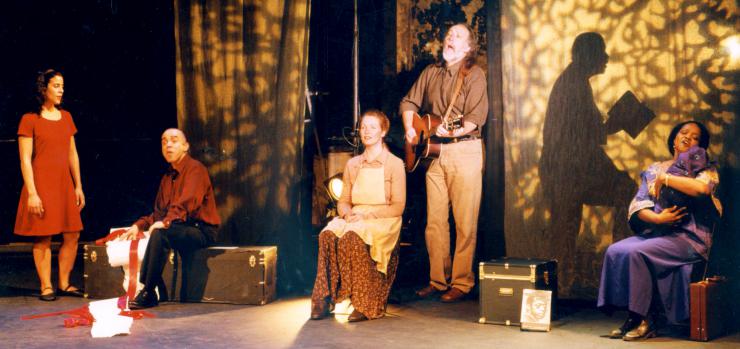
In 2002, Roadside ensemble member Ron Short created a one-person show about how his people established themselves in America. He called it BETSY after his great-great-great-grandmother Elizabeth. In 2003, Roadside took BETSY to the Nashville Jazz Workshop where Beegie Adair, legendary jazz pianist, friend of Roadside, and originally from Horse Cave, Kentucky, saw connections to her own family story. Delighted by the connection, Roadside and Beegie began creating a new musical version of BETSY, which they subsequently performed at the Nashville Jazz Workshop in 2004 with three actors/singers and a four-piece band.
As part of its ongoing exchange with Pregones, Roadside brought this new version of BETSY to the Bronx where Pregones artists were drawn to the play’s theme of American identity. How did we get here? Who do we think we are? And what is our DNA now revealing to us about these questions? Public performances of a new BETSY co-created with the Pregones ensemble and its composer Desmar Guevara occurred in 2006 and 2008 in the Bronx.
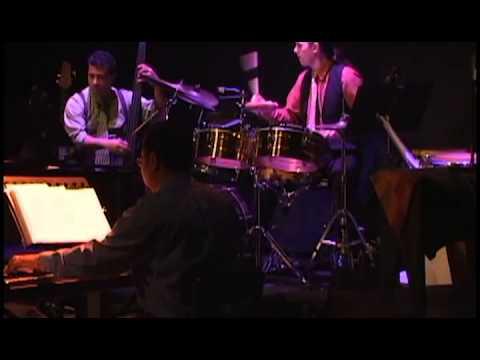
Pregones Theater, and Roadside Theater.
“This collaboration was always as much about exploring ideas as it was about flirting with two different ways of making theatre, both intrinsically musical,” says Rolón. “BETSY! has grown over time to include distinctly Latino perspectives and sounds, layers of meaning embedded in the magic of casting, staging, [and] performance.” Today, Pregones and Roadside artists are jointly elaborating the story of Latin Jazz musician Pedro Garcia, Betsy’s father, and the protagonist’s own musical journey. And yes, they’ve added the exclamation mark to the BETSY! title.
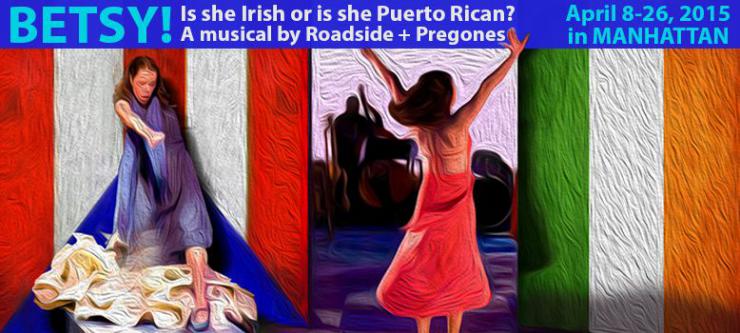
BETSY! tells the story of a Bronx jazz singer and performer forced to confront her twin Spanish Caribbean and Scotch-Irish roots. Her dilemma stirs up a many-layered narrative that links an orphaned teenager tricked into leaving Ireland in the eighteenth century, her seducer, and their descendants, all the way down to Betsy as she searches for her identity in the rhythmic pulse of twenty-first century New York. As Álvarez notes: “The complicated sensuality of being two things at once—of acknowledging with dignity the two places that inhabit you—remains one of the universal challenges of all times.” Delivered by three vocalists and a five-piece band with piano, violin, guitar, banjo, cuatro, mandolin, bass, drums, and percussion, the musical’s eighteen original jazz, bluegrass, and Latin compositions amplify the narrative of American identities.
“BETSY! takes the subject of diversity off the grid of predictable vectors—large/small, community/professional, wealthy/low income,” Álvarez theorizes. "By exploring it in depth from a dual subject position on the margins, the exercise of telling each other’s stories immediately becomes far more textured and complicated. It is a doing together that obeys the coordinates of aesthetic experiment, enjoyment, success, and failure—a certain poetics of creative practice, with or without the burden of a message of uplift."
Imagining America and Collaborative Knowledge Production
Scholars from across the country are collaborating with Roadside and Pregones to investigate the rich and tangled history dramatized in BETSY!, and to develop new scholarship and multimedia about the values, vision, practice, and complexities of intercultural artistic collaboration. When the artists expressed interest in developing a learning guide about the play, one of the members of the BETSY! Scholars’ Circle, Syracuse University’s Dr. Jan Cohen-Cruz, suggested the ensembles “develop content with scholars, not just for scholars.” Miami University PhD candidate Jonathan Bradshaw interviewed five Scholars’ Circle professors and discovered that their students lack high-quality multimedia materials that make the creative process and its artistic choices visible. Plays, and the artistic experience in general, are an underutilized resource for creating knowledge. This semester, Scholars’ Circle members are integrating BETSY! into their courses, bringing students to the performance, and participating in discussions with the artists.
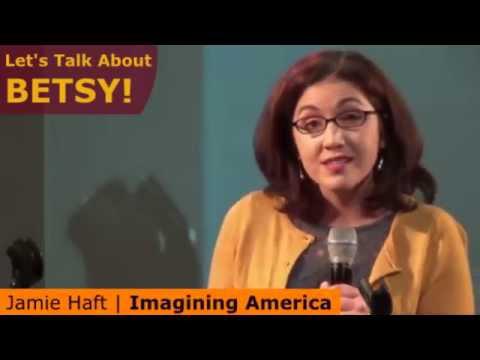
of Pregones Theater and Roadside Theater.
To document the process, José Zárate, MFA in dramatic writing from Arizona State University, is serving as the BETSY! guest web editor. José currently lives in South Korea and is skillfully collaborating with Zhivko Illeieff, Roadside web community coordinator, and Donna Porterfield, Roadside managing director and playwright. This team created the media for this article and for other posts in this week’s blog series, making such content accessible for the first time.
Imagining America: Artists and Scholars in Public Life has joined the partnership to engage faculty and students and to share the project's learning nationally with its consortium of 100 colleges and universities. The play’s themes speak directly to the organization’s work of imagining America. Ancillary events scheduled include an institute to discuss the implications of the play’s themes and aesthetic with sixty faculty, students, and community artists from Cornell University, Ohio State's Barnett Center for Integrated Arts and Enterprise, Oregon State, University of Wisconsin, Loisaida Center, and several other institutions, on April 10–11, with thanks to support from Cornell’s Engaged Learning + Research Center; a national dialogue about integrating live theatre with digital documentation, on April 18, convened by Public: A Journal of Imagining America and its editor Dr. Jan Cohen-Cruz; and a meeting of scholars, leaders, and students, including guests from Virginia Tech, looking to champion the role of the artist and the artistic experience in the production and circulation of knowledge, on April 19.
Thanks to the Joy of Giving Something Foundation, high school and college photography students in New York and from across the country are interpreting BETSY!’s meta-theme of our complicated DNA, and a selection of their work will be exhibited at the theatre during the April performances. (Students, submit your photos by April 1.)
Email [email protected] to learn more and get involved.
What’s Ahead This Week
We have an exciting series planned of multimedia blog posts. On Monday there will be two blog posts: actress Elise Santora will share her personal connection to the role of BETSY!’s shape-sifting guide, Spirit, and Appel Farm’s Dr. Ben Fink will consider intercultural artistic collaboration through the lens of community organizing. Tuesday, Dr. Stephani Etheridge Woodson of Arizona State University will situate theater artists as public intellectuals and their ensembles as cultural development organizations. Wednesday, Miami University’s Jonathan Bradshaw will demonstrate the hybridity of Appalachian and Puerto Rican music traditions with interviews of BETSY! composers Desmar Guevara and Ron Short, and banjo player Sylvia Ryerson. Thursday, University of Connecticut’s Dr. Lindsay Cummings will discuss empathy in BETSY!. Friday will feature poetry by Caridad De La Luz, aka La Bruja, who will be playing the title role in BETSY!. Our series finale on Saturday will be the publication of “Drama and the Shattering of Myths,” new scholarship by University of Arizona’s Dr. Maribel Álvarez. As the quotes by Álvarez in this article demonstrate, her analysis is passionate and full of insight!
Throughout the week, comment here on HowlRound, on Twitter at @pregonesprtt and @RoadsideTheater, and on our BETSY! Facebook event page. Join us for BETSY!’s Off-Broadway premiere at Pregones Theater/Puerto Rican Traveling Theater (304 West 47th Street), April 8–26, 2015.

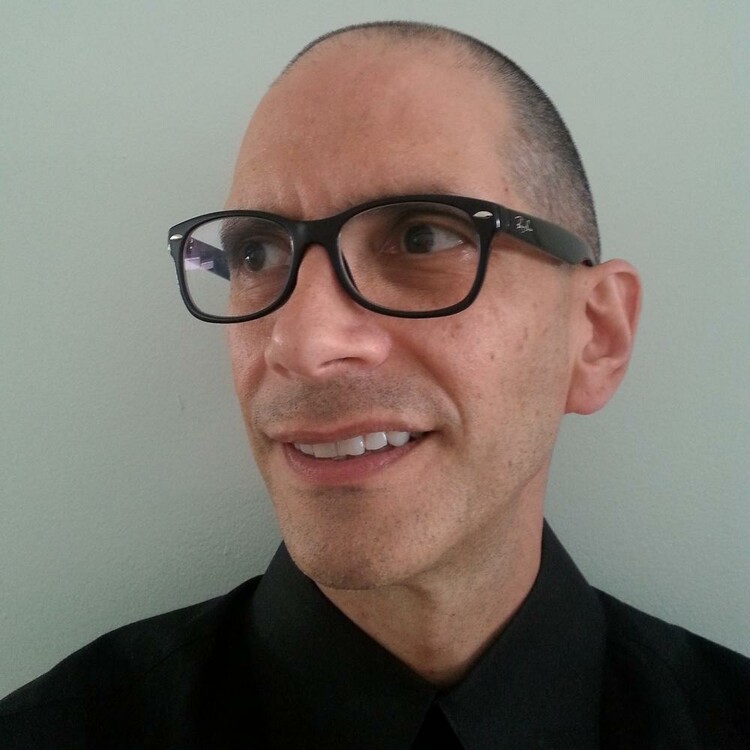
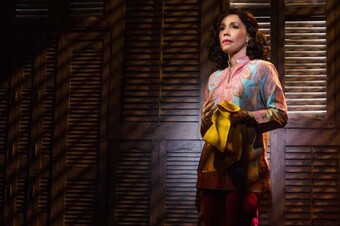


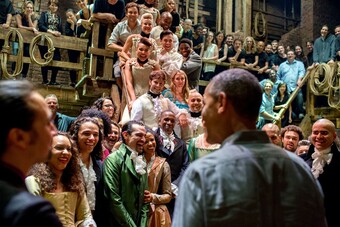

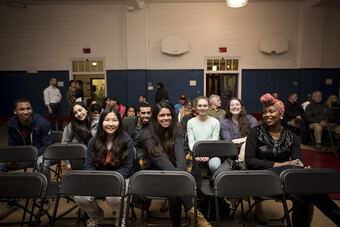

Comments
The article is just the start of the conversation—we want to know what you think about this subject, too! HowlRound is a space for knowledge-sharing, and we welcome spirited, thoughtful, and on-topic dialogue. Find our full comments policy here